Midge Ure: The 13th Floor Interview
Midge Ure has worn many musical hats over the years, and he’ll be trying them all on during his upcoming, 7-date Something From Everything New Zealand tour. In addition to his own solo work, writing the Band-Aid anthem Do They Know It’s Christmas? and his band Ultravox, Ure was a member of Slik, The Rich Kids, Visage, and, for a short while, Thin Lizzy.
The 13th Floor’s Marty Duda spoke to Midge Ure recently to discuss his past musical adventures and his current tour.
Click here to listen to the interview with Midge Ure:
Or, read a transcription of the interview here:
MD: I think I read somewhere that you recently appeared on a TV show, where you went back visiting the areas that you grew up in; and you were doing a bit of looking around. I was wondering if you’re in a mood where you’re in a period of reflection of some sort?
MU: … I’m sixty three now, and I think you do reflect; but I think I’ve always reflected. There’s always been a moment, in any given time, when you find yourself so far removed from your roots – you find yourself living in London in an eight bedroom house on the river with a garage full of classic cars, and the world’s at your finger tips, and everyone wants you to write and produce for them, and direct videos for them – and sometimes, you can feel yourself getting carried away with that. Well, my antidote would be to go back up to Glasgow, and I’d walk round the streets that I used to tramp round when I was a kid, dreaming of doing what I do: dreaming of “Wouldn’t it be wonderful having a guitar,” “Wouldn’t it be wonderful being able to perform on stage,” “Wouldn’t it be wonderful going on tour.” It kind of makes me think that I’m incredibly grateful for what I’ve got; so, I’ve always gone back there, not out of pure nostalgia, but to remind myself that I’m just one of the lucky buggers: one of the lucky ones who get to do the job that they’ve always wanted to do; so, I use that as a leveller, really. I did go back recently and did this television show. It was quite interesting.
MD: How has the area changed over the years – in the last fifty years since you were growing up there?
MU: I think it’s always shocking to see how depressing it is – how depressed the area is – because there’s no work, there are no jobs, the factories are all gone, the infrastructure’s changed. Physically, of course, the place changes: buildings that you knew and loved and remembered have gone, and they’ve put up some modern monstrosity in their place – which have usually got empty units in them – and it kind of gets depressing. The one thing that raises your spirits is talking to the people again: I’m walking down the street – there’s a camera half a mile away, and they’re filming me walking through the crowd – and I could only go about two or three feet without people stopping me and saying, “I knew your granny, son.” This is just wonderful! It’s the reality of it. They don’t change at all, and they treat you exactly the same; and that’s wonderful. It’s the greatest thing about going back home.
MD: It’s got to give you a bit of grounding, when you encounter that after all those years.
MU: Well, they’re the bloody people who would give you a clip around the ear if you got above your station.
MD: Musically, how did… where you came from… have any effect on the music that you made?
MU: I didn’t think so. At school, the only music we were taught was traditional Scottish music; all of these traditional Scottish tunes, which I had absolutely no interest in. My head was full of The Beatles and The Rolling Stones and Gerry and The Pacemakers, and whatever I could hear on the radio – tucked under my blanket at night with my tiny little transistor – that’s what I was picking up on. Then, many years later, I found myself with Ultravox. I found myself recording with the Irish traditional band, The Chieftains. And when The Chieftains played one of my melodies with their traditional instruments, it was so stupidly Celtic! That stuff that I’d been avoiding all my life, had obviously sunk in; and I realised that the melodies that I write are incredibly Scottish, and I hadn’t noticed it because I was doing it on different instrumentation.
MD: Yeah, that’s pretty wild, that you figure that stuff’s just engrained in the DNA somewhere, and there’s nothing you can do about it.
MU: Yeah! I think you breathe it in. It comes with the fog and the soot and the smog.
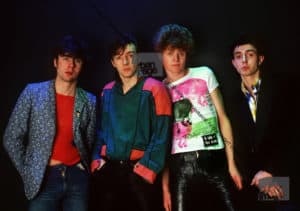
MD: … There was a brief period of time when you went from The Rich Kids to dabbling with Thin Lizzy for a bit, and then into Ultravox; which are three very different musical entities. I was wondering for you, what was like, to move from one to the other to the other, or doing all those three simultaneously? Was it challenging? Was it exhilarating? How did you deal with it?
MU: It’s not the sort of thing you could plan. You couldn’t sit down and make a little life map and say, “In 1979, I’m going to buy a synthesiser and I’ll put Visage together. Then, somewhere during making the first Visage album, I’ll get a phone call from Phil Lynott, asking me to go to America for the first time and finish a tour… but in the mean time, before I decide to do that, I’ve just joined Ultravox.” You cannot write those things; those things just unfold. Long before I was anywhere near a synthesiser or a drum machine – to form Visage – I was a guitar player; so, to me, music was either good or bad; it wasn’t really genres. I’ve never seen the categorization of music work. It’s not a library. It’s not like you’ve got different formats: so, therefore, the horror department is over there, and you can’t put the bakery books in the horror department, and you can’t put novels in with biographies; all of that. I’ve never seen music like that. I’ve
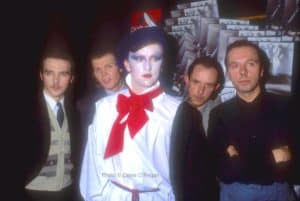
always seen music as good or bad. And, for me, putting Visage together was as punky as me joining The Rich Kids, or the way the new wave explosion happened in 1976-1977, when bands who couldn’t play would throw a band together because it was the antithesis of Yes or Led Zeppelin or Journey or Styx or whatever; so, the attitude of putting a synthesiser band together, when I knew nothing about synthesisers, was just as outrageous. It was something I was building. I was making something that other bands were going to follow. And during that process, I ended up joining one of the Visage members – who was the guy from Ultravox – Billy Currie. I ended up joining Ultravox, then was phoned up, “Do you want to go do this tour with Thin Lizzy?” I was never a permanent member of Thin Lizzy: I was there while they were looking for a proper guitarist. The great thing was that every time they would do an interview, Philip would turn around to me and say, “Right, you talk to the journalist about Ultravox. Tell them what’s happening;” so, he gave me the opportunity to say, “Ultravox is still going! We’re making a new record,” and do all of that. It all kind of worked; although, on paper, it looked like I couldn’t decide which way to turn.
MD: It seems like Phil Lynott must have been a very supportive guy then. What can you tell me about him?
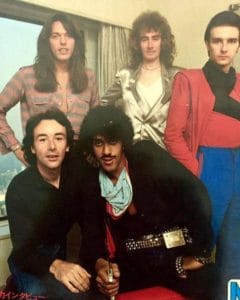
MU: He was a lovely guy. I saw Thin Lizzy when I must have been fourteen or fifteen, I think. I saw them play in a small club in Glasgow, in the very, very early days, when they were a three piece band – before their first album came out – and I thought they were fantastic. I thought Philip was a brilliant singer and a great song writer: he wrote beautiful songs, wrapped in a rock instrumentation. And I got to know him: I met him when I moved to London to join The Rich Kids. We used to hang out together. That, I think, is why he asked me to come out and finish this tour for him; come out to America for the first time and replace the guitarist, Gary Moore, who had been ousted from the band. All the time I was doing that, Philip acted like my big brother: he kind of took me under his wing. I remember every time we would travel from hotel to an airport to whatever in a limousine – because we were opening up for Journey on this tour; so, it was big places we were playing – and we’d all take turns at playing our favourite pieces of music in the limo. And I could see… the rest of the band had gone, “Oh, God! It’s Midge’s turn now,” and I’d put on Kraftwerk or Magazine, or something really dark and morose or electronic; and Philip was intrigued by this: he thought this was quite interesting, and the rest of the band hated it; so, he obviously took this on board, so that when it came to recording his solo material, he asked me to get involved in writing and producing some of that for him; so, Philip was really open. He was a bit like me, in that respect. He didn’t just see rock music as, “It’s got to be this, it’s got to be leather, it’s got to be rock & roll; it’s got to be flash and explosions, and whatever.” He expanded his mind a little bit, and let other things in.
MD: And of course, there are still some of the guys from Thin Lizzy out on the road. I think they’re recording under the name Black Star Riders these days. Are you following their procedure in carrying on with the legacy of Thin Lizzy?
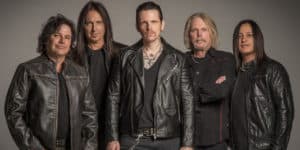
MU: Absolutely! Black Star Riders have got an album that, I think, is currently number two in the UK, right now; the new album’s doing incredibly well. They do sound very like Thin Lizzy, because I think they called themselves Thin Lizzy for a while, prior to not being able to use the name. But yeah, they’re doing great business, because people still want to hear those songs performed – they were just great songs – and the band are an excellent band, I have to say; just fantastic! I saw Scott Gorham – one of their original guitar players – recently. And, in fact, they did a show in the UK last summer – a big rock show – as Thin Lizzy, and they asked me to come up and play The Boys Are Back in Town and the Cowboy Song, which I hadn’t played for a few odd years, but I remembered it, weirdly; it all came flying back. It was great!
MD: You mentioned that people want to hear those songs, and that’s kind of what your tour is about… the Something From Everything tour…. What kind of band have you put together for this tour that we’re going to hear when you come around to New Zealand?
MU: It’s a slightly different line-up. The last time I came to New Zealand, two years ago, I 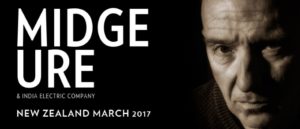 was on my own. This time, I’ve got these two, young multi-instrumentalists, who are a band in their own right: a band called The India Electric Company. The India Electric Company opened up for me a couple of years ago – I give my opening slots to up-and-coming artists, to let them get in front of an audience – and the couple of times that I really pricked my ears up and listened to the opening acts – because a lot of them are very similar – these guys just stood out. It was The India Electric Company each time, and I’m saying, “There’s something resonating there, between what they’re doing and what I like,” and I asked them to come on tour with me to perform an album that I had recorded twenty years ago, called Breathe – to do an anniversary tour of this album – and it was a very organic instrumentation on this record. And these guys jumped at the chance of touring with me. They’d do their own spot for half an hour, and then come back on again with me, and do all my stuff; and it’s just worked incredibly well. S o, when we finished the Breathe tour, I came up with the idea for the Something From Everything tour, mainly so that we could carry on working together, because we were having such a ball, and making such a beautiful noise. I’ve taken songs from The Rich Kids – in 1978 – through Visage – early ‘80s – through Ultravox – up to the mid-‘80s – and then solo material. And I’ve tried to play at least one song from every album that I’ve been associated through that period – and that’s at least fourteen albums – so, it was a long, gruelling task to find the songs that still meant something to me: that still resonated today, and still stood up as an interesting song. We give them all this quasi-acoustic instrumentation, and it kind of glues them all together; it’s incredible. You can’t really tell a song that’s forty years old that’s sitting next to a song that’s two years old; so, it kind of gives them all a flavour, but they’re still, very recognisably, those songs.
was on my own. This time, I’ve got these two, young multi-instrumentalists, who are a band in their own right: a band called The India Electric Company. The India Electric Company opened up for me a couple of years ago – I give my opening slots to up-and-coming artists, to let them get in front of an audience – and the couple of times that I really pricked my ears up and listened to the opening acts – because a lot of them are very similar – these guys just stood out. It was The India Electric Company each time, and I’m saying, “There’s something resonating there, between what they’re doing and what I like,” and I asked them to come on tour with me to perform an album that I had recorded twenty years ago, called Breathe – to do an anniversary tour of this album – and it was a very organic instrumentation on this record. And these guys jumped at the chance of touring with me. They’d do their own spot for half an hour, and then come back on again with me, and do all my stuff; and it’s just worked incredibly well. S o, when we finished the Breathe tour, I came up with the idea for the Something From Everything tour, mainly so that we could carry on working together, because we were having such a ball, and making such a beautiful noise. I’ve taken songs from The Rich Kids – in 1978 – through Visage – early ‘80s – through Ultravox – up to the mid-‘80s – and then solo material. And I’ve tried to play at least one song from every album that I’ve been associated through that period – and that’s at least fourteen albums – so, it was a long, gruelling task to find the songs that still meant something to me: that still resonated today, and still stood up as an interesting song. We give them all this quasi-acoustic instrumentation, and it kind of glues them all together; it’s incredible. You can’t really tell a song that’s forty years old that’s sitting next to a song that’s two years old; so, it kind of gives them all a flavour, but they’re still, very recognisably, those songs.
MD: You mentioned that you’re going to be performing some of The Rich Kids’ songs as well, and I’m interested in some of the characters that you worked with – obviously, we’ve talked about Phil Lynott – but one guy who seems to be some kind of enigma in rock & roll history is Glen Matlock, you worked with in Rich Kids. I was wondering if you could give me an idea of what kind of musician he is, what kind of ideas he brought to the band? There’s some debate about what he contributed to The Sex Pistols, and I’m just curious what he’s like, from your point of view.
MU: Glen’s a lovely guy. Glen’s an excellent musical musician. In fact, I think one of the lines
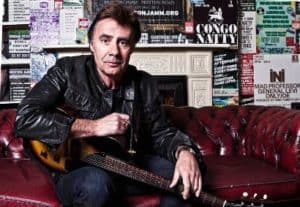
that the Pistols came up with, when they kicked him out of the band, was that they kicked him out because he liked The Beatles; which is a fantastic sound bite, but probably not that true. He was incredibly musical in the Pistols; although, I didn’t know him at the time. And when he left the Pistols and formed his own band, The Rich Kids, he had a real problem finding what he thought was the right front person – the right singer, the right character for his band – and out of all the musicians he could have asked, he asked me to join his band; which was a tough thing to do, because I had just come from a Bay City Rollers type of band; that’s what they were perceived as – a band called Slik – and that’s a tough call. That made his band more difficult to grasp, because people couldn’t quite figure out whether we were a punk band or a pop band, and they called us power-pop; and it was a horrible process. He was incredibly brave doing that, and I didn’t see that at the time; but in hindsight, I see that, because he threw me a life line when I should have been dead and gone: I’d had my fifteen minutes of fame with Slik, and he gave me the opportunity to grow up, musically. So, I very strangely repaid him by buying a synthesizer, bringing it into The Rich Kids, with this idea of using electronics and rock instrumentation; which he hated, and it ended up breaking the band up! The half of the band that loved the synthesiser went on to form Visage, and Glen went on to do what Glen’s done for the last thirty-forty years.
MD: Well, it all makes sense now that you explain it…
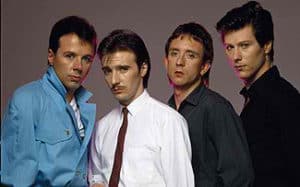
MU: On paper, my life looks like I’m a dreadful, old musical toff, but the reality is, all this stuff leads to other things: you can’t plan a life like mine; things unfold. I had genuine interest in bringing a synthesiser into The Rich Kids, and integrating this electronic instrument with standard rock guitar, bass and drums; which is exactly what I did with Ultravox. The vision was there, but the band wasn’t the right band to do it with; Ultravox was.
MD: Once you’re done with this tour, do you have any musical plans, as far as making anything new, or are you going to go back and reunite with somebody? What’s the deal?
MU: I’ve been doing a huge amount of live work over the last couple of years – I’m very rarely at home – but when I have been at home – over the last year – I’ve been working on an orchestral album: an album of some of the old Ultravox things, some of my solo stuff. I spent a long time finding the right person to do this with. I didn’t want to do an album that was just like a… K-Tel record: these records you see where somebody comes along, and they’ve been shoved in a studio for an afternoon, and they redo all their hits with an orchestra, and then someone sticks it out; and it just sounds like it’s dreadful. I wanted to take the songs somewhere else, and give it the cinematic quality that Ultravox and my music has – always has had: that drama, that dynamic – but do it with an orchestra. So, I’ve been working on that, and by the time I’ve finished in New Zealand, I’ve got to come back and just complete that album; which will come out sometime later this year; I’m not sure when. I’ve been doing that in between doing all the touring that I’ve been up to; so, it’s been a fairly intense couple of years.
Midge Ure tours New Zealand in March.
Click here for tour dates and tickets.
- Civil War – Dir: Alex Garland (Film Review) - April 9, 2024
- Pearl Jam – Dark Matter (Monkeywrench/Republic) Album Review - April 1, 2024
- Blonde Redhead – New Zealand Tour 2024 - March 14, 2024
